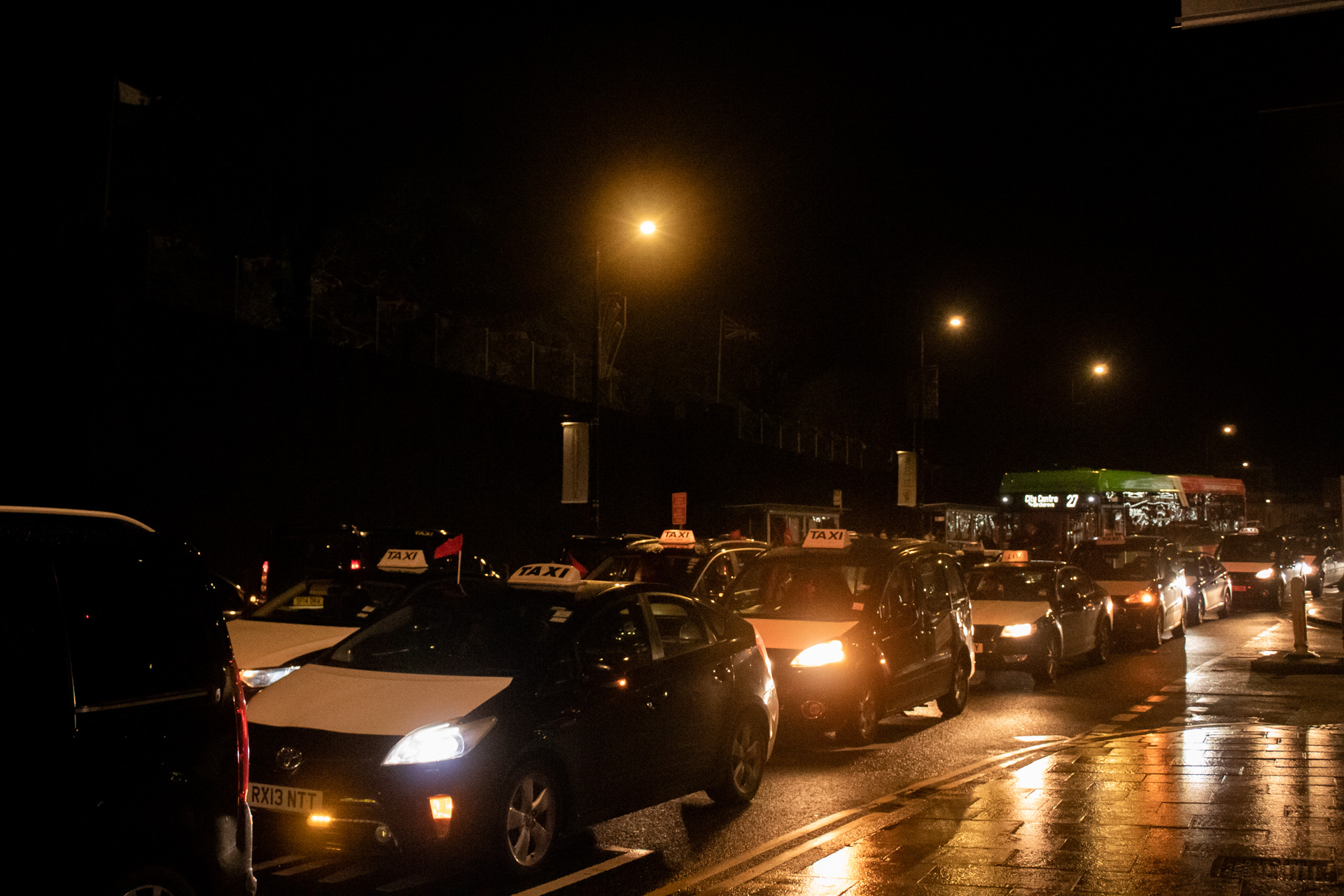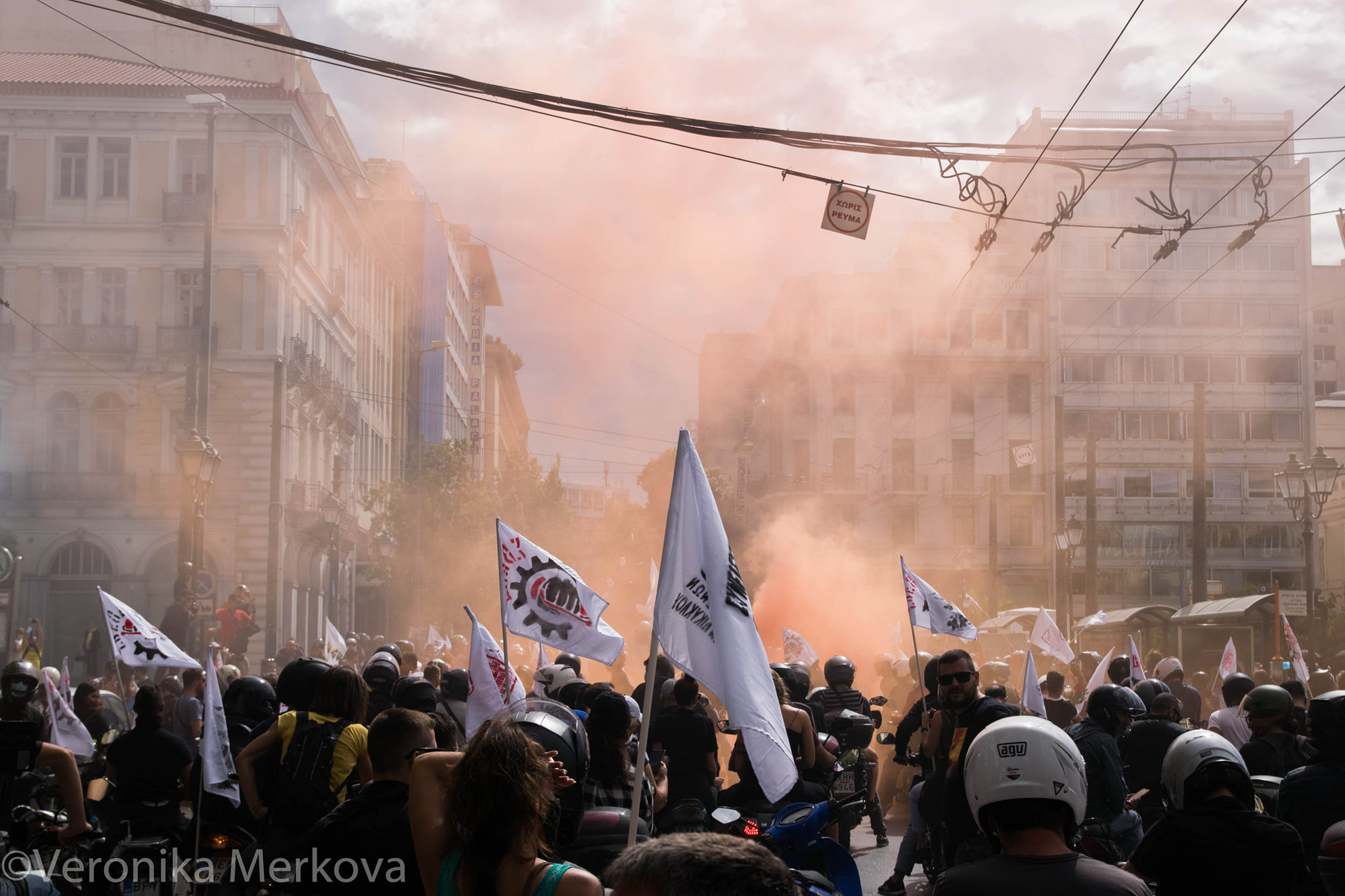
The Stagecoach Strike & Workers Resistance In The Age Of Climate Breakdown
Bus drivers in south Wales have been on strike for four weeks against low pay and cuts to basic terms and conditions, in one of the most significant industrial disputes in recent years. Their strike comes as the COP26 climate summit of global leaders in Glasgow fails to address the environmental crisis. SC Cook spoke to bus drivers and activists about the Stagecoach strike, workers’ power and resistance to climate breakdown.
* Since this piece was written, the Unite union has announced that Stagecoach workers will vote on a deal that could end the strike.
Image: striking stagecoach workers, copyright voice.wales.
On the morning I first visit the picket line of striking Stagecoach bus workers in Blackwood, it is still dark and pouring down with rain.
Standing on the side of the road is a small crowd of people wearing high vis vests.
These members of the Unite union have been standing on the side of the road since 4am, sometimes in driving wind and rain, holding union flags and placards. Workers hold signs aloft alerting drivers in each passing car of their demands: A £10.50 per hour living wage and no cuts to terms and conditions. Many beep their horns in support.
This was the second day of the strike, Wednesday 14th October. By the time I visit the picket line again, bus drivers have been out for thirteen days over a three week period.
But they are prepared to be on strike for much longer if needed, and have served notice to all out for two months until the middle of January.
In an area that was the beating heart of the year-long miner’s strike of 1984/85, it is not insignificant that workers are gearing up for such a major showdown over the Christmas period.
But for bus drivers on the picket line that morning, defeat wasn’t something they could think about, because the situation they face now cannot continue.
As things currently stand, their wages don’t cover the cost of living, even when they work full time. Add into this the spiralling cost of living, and these workers face a bleak future if they don’t get a proper pay rise.
Other wages in other sectors are going up, but ours isn’t.
For Eleanor, a driver who spoke to me as she stood on the picket line, life on low pay is hard.
“I’m on my own,” she says. “I’ve got three children who are older and I’ve got three grandchildren. You know, it’s Christmas coming.”
I ask if she struggles with the current levels of pay.
“Massively, massively,” comes the response, adding that it’s difficult to afford food and bills even before Christmas presents for her grandchildren come into it.
The fact that Eleanor worked throughout the pandemic, and was lauded as a hero by her bosses as she saw her colleagues fall seriously ill, makes the fact that she will struggle to afford Christmas even more difficult to take.
“It’s like you work all the way through it and this is the thanks,” she says. “There’s no gratefulness at all.”
For these reasons Eleanor is determined to fight for a pay rise. “I’m not gonna quit, we’re in it together.” she tells me as the rain continues to fall. “For the community as well.”
For the bus drivers on strike, at three depots in Blackwood, Cwmbran and Brynmawr, a pay rise hasn’t been seen for at least two years.
Stagecoach don’t pay their drivers a set rate, but have different rates for each depot and South Wales’ are among the lowest in the UK. For those at Cwmbran and Blackwood, the rate is just £9.50 per hour, below workers in Bristol, Cheltenham and other areas.
But for new starters up the road in Brynmawr, it’s been the minimum wage rate of just £8.91, a wage that is simply not possible to live off.
Following earlier negotiations, Stagecoach Wales made an offer to put their pay up from its current rate of £9.50 to £10.30 per hour.
But in return for this rise, which is still below the striker’s demands, the company said other conditions and rates of pay would be cut. This is why workers have branded it a ‘self funded’ pay rise.
As part of the measure, new workers will no longer be paid during periods of so-called ‘down time.’ During this ‘down time’, they will still be at work, they just won’t be driving a bus.
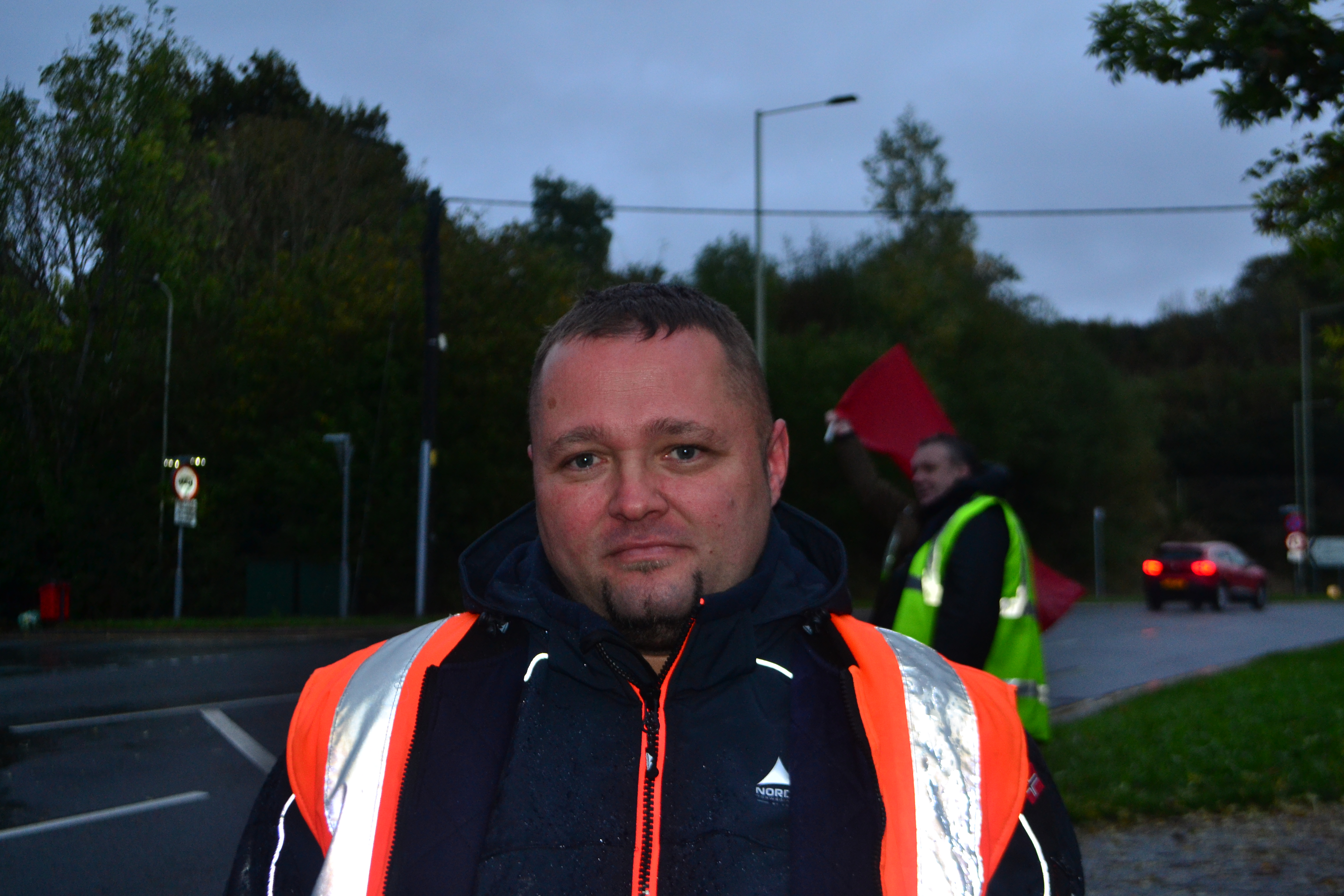
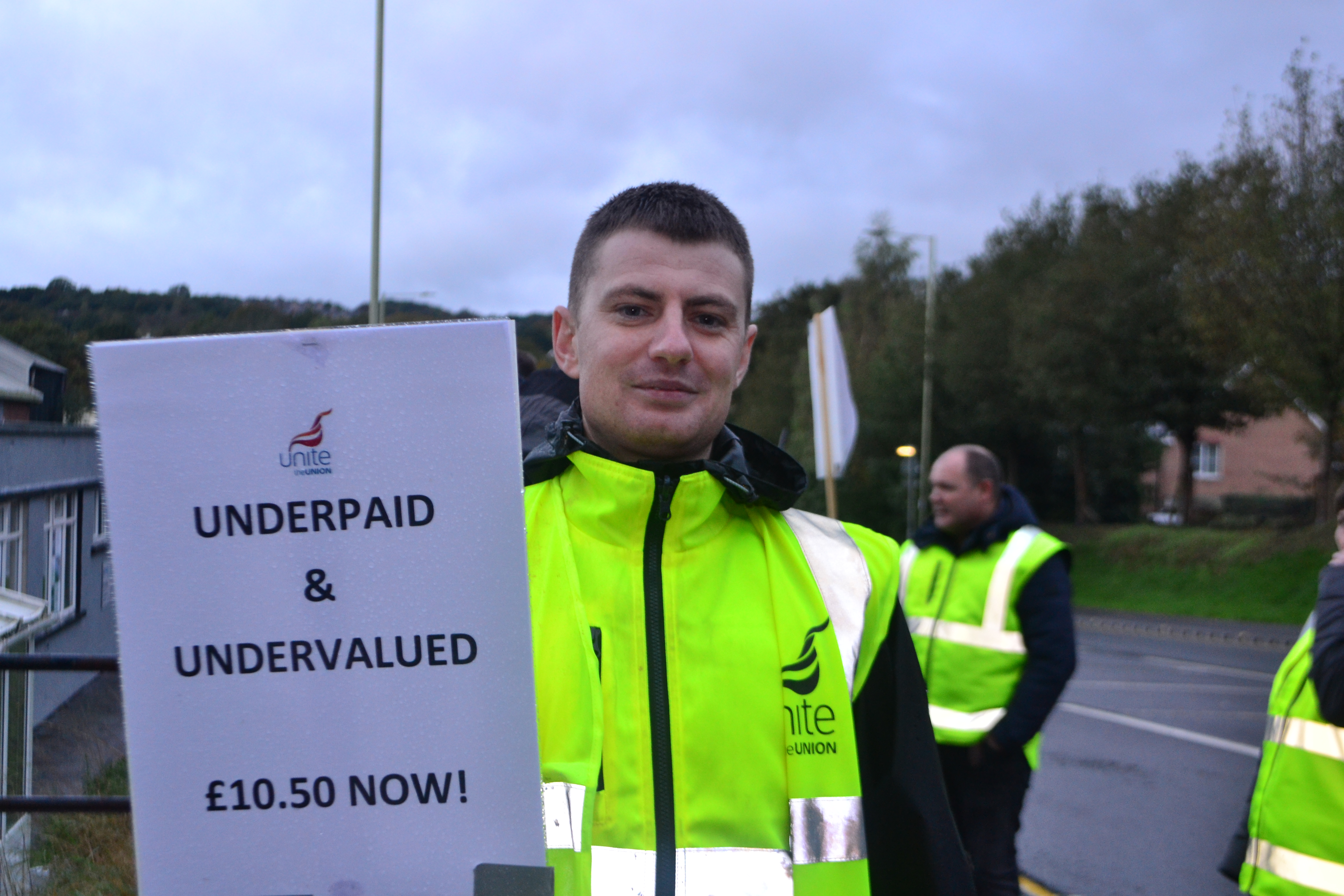
Image: striking bus workers
As Lee Hunt, a bus driver and branch secretary for the Blackwood and Cwmbran depots explains to me, this means that whilst a more senior member of staff could get paid for 11 hours work, a newer driver might only get paid for 8 hours, even though they have been doing exactly the same thing.
“It’s not looking after potential future employees, future members and things like that,” he says.
On top of this, sick pay won’t rise at the same rate as normal pay, meaning drivers will take a pay cut every time they’re off. After a pandemic which has seen workers in frontline jobs get seriously ill with coronavirus, this is particularly cruel.
For the workers in the Blackwood depot who spoke to me that morning, sick pay is only paid at 50% of normal pay anyway, and only then if you have been employed for over a year.
“You get one week at 50% for every year you’ve worked after year one,” explains Lee. “So for argument’s sake, if I’ve worked here for seven years I’m only entitled to 6 weeks at 50% and then I’m on statutory sick pay.”
If the current changes go through though, the ratio of sick pay to wages will fall even lower than 50%.
“Everything is going up at the moment,” Lee says. “Other wages in other sectors are going up, but ours isn’t.”
“And it’s got to the point now, where it is a struggle on the wages we’re on…there’s a lot of stress on us trying to make ends meet.”
Like Elenaor, Lee talks about the essential role that drivers like him played throughout the pandemic, often whilst their highly paid bosses worked from home.
“NHS staff relied on us heavily to get back and forth to the hospitals. So did other key workers…we played a big part. And we’ve had nothing from the company to show for that so we feel that we need to make a stand.”
The strike is solid, with almost every single driver in the depot a union member and no one crossing the multiple picket lines.
The situation Lee describes isn’t new: workers have faced stagnating pay for years, but a perfect storm of low wages, the experience of the pandemic and a labour shortage is meaning that more are deciding to strike and for the first time in decades, they could have the upper hand.
This is partly because low pay in the sector is having a knock-on effect on the rest of the labour market, with some bus drivers moving onto better paid jobs in the haulage sector.
“Because we’ve got such a low rate of pay here,” Lee explains, “some of our drivers are actually paying for their HGV licences themselves, and then changing job positions and going elsewhere.”
Like workers in other sectors, this puts drivers in a strong position to push back against years of stagnating wages. Because if pay doesn’t rise, or huge cuts are made to terms and conditions, the crisis facing the service will only get worse. As Lee says: “If we were on that [better pay rate], we could retain the staff we’ve got.”
If Lee and the other drivers are successful, it will represent a major victory in places that have been battered by years of stagnating wages, job cuts and government-led austerity programmes.

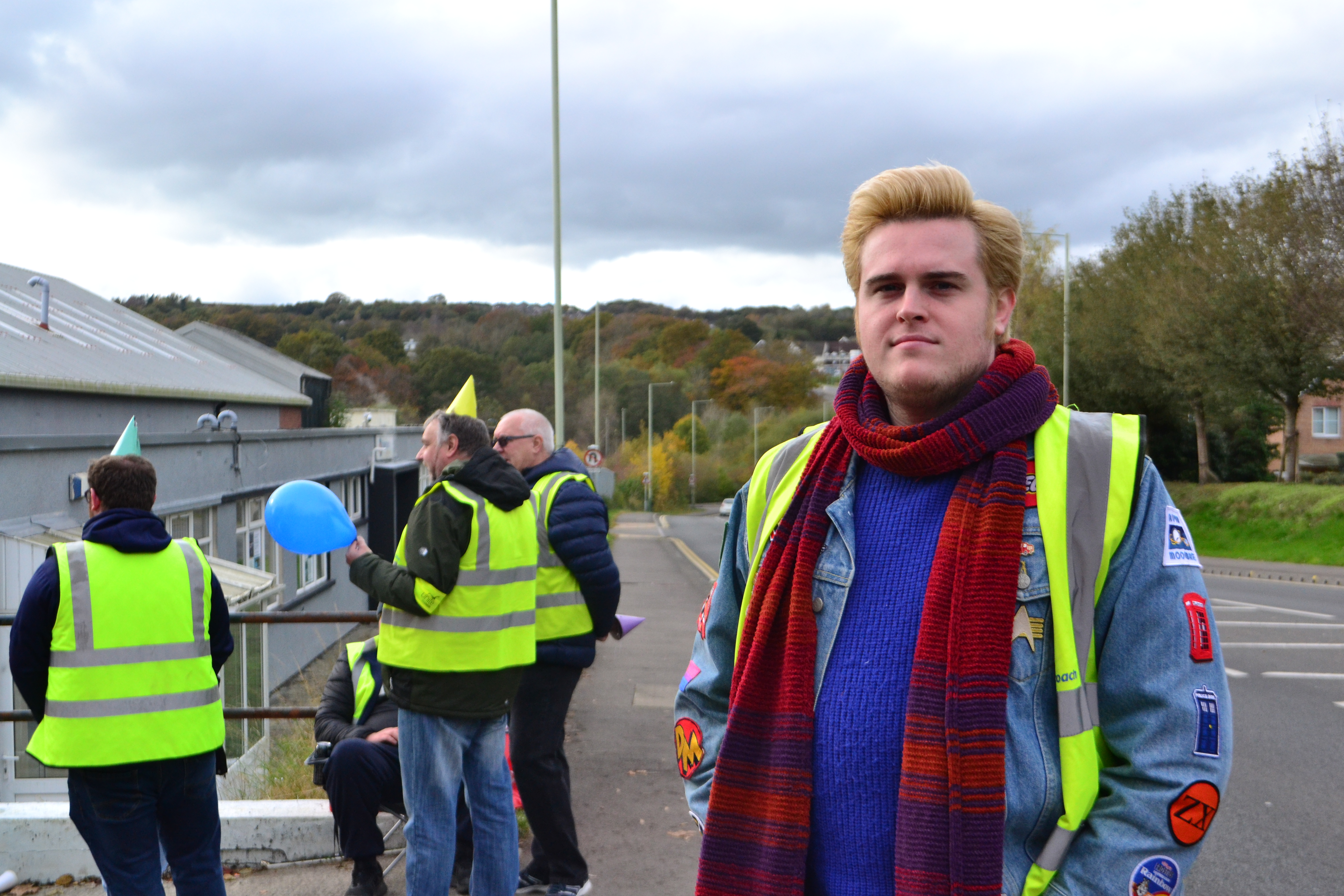
Image: striking bus workers
A week or so after my first visit to the picket line, I speak on the phone to Alan McCarthy, the Unite regional officer for the strike. He tells me some shocking information about the effects of low pay for workers in the Brynmawr depot.
“The new starters that come in are on £8.91,” he explains. “And I’ve had some of those drivers say, in tears, you know, ‘I’m worried about where I’m going to be if we don’t get £10.50. I’ve been to food banks’ – and they’re embarrassed to say it.”
This only compounds an already tough situation facing workers and their families in the area.
In the constituency of Blaenau Gwent, where Brynmawr sits, over 40% of workers are in precarious jobs and lower paid jobs, such as accommodation, hospitality and retail, where risk of redundancy is higher than in other sectors.
The same figures also show that the area had among the highest increase in Universal Credit applications during the pandemic and has one of highest rates of child poverty in Wales, at 33% and climbing. All this in the depot where pay is the lowest.
As one driver put it to me on the picket line: “They say these are poor places, well maybe they wouldn’t be if they paid people properly.”
No wonder there’s anger at the fact that whilst these essential workers are expected to accept a life of low pay, hard work and eroded terms and conditions, their company bosses have awarded themselves a bumper pay rise.
According to Companies House, the highest paid director of Stagecoach saw their total remuneration rise from £93,000 in 2016 to £180,000 by 2021. In the same time period, drivers have seen their pay rise by less than 75p an hour.
“So we’re talking about an 89% increase in the highest paid directors’ pay at the same time their drivers are attending food banks,” says Alan McCarthy from Unite.
Workers and the climate crisis – ‘When the motivation is profit, it’s always going to come at the sacrifice of something.”
As workers stood out to picket on Monday 1st November to begin their third week of strike action, rain again poured down from the sky, causing flood warnings to be issued in parts of South Wales. It had been raining all night and by now, they were used to it.
On that same morning, 383 miles away in Glasgow, the COP26 climate summit kicked off, just as cleansing workers in the city, like those in Blackwood, Cwmbran and Brynmawr, went on strike over pay.
Climate change is ripping through some parts of the world more than others.
But for some time, it’s felt possible to avoid the worst effects of climate change in countries like Wales. That’s no longer the case, even if the climate crisis is still ‘better’ here than elsewhere.
As the crisis intensifies, people in Northern Europe can expect wetter winters and with them, an increased risk of flooding.
In February 2020 homes not too far away from the Stagecoach picket lines were badly flooded, when storm Dennis hit the South Wales Valleys, and Rhondda Cynon Taff particularly hard.
Alongside storm Ciara, which hit the north of Wales just a week earlier, the floods impacted 3,130 homes and business properties across Wales.
In the years since, concern about the environment has grown, and events like Storm Dennis are no longer once-in-a-generation disasters or something that only happens elsewhere.
For bus drivers on the picket line that morning, the links between their jobs as public transport workers and the climate crisis wasn’t hard to see.
“As the workers, we’d rather people have some sort of free park and ride so they can get onto our buses, give us more work and keep the traffic off the road,” says Lee Hunt the Unite branch secretary, pointing to the stress that congestion puts on drivers.
“It’s an easier living for us and it’s bringing the emissions down on the [town] centres and everything else.”
Steven makes a similar point, saying that workers would ultimately like to offer more services and be able to contribute to the fight against climate change. “Obviously, the more buses that are running the less cars are on the road, which is better for the environment.”
But to make a difference, he says “they need to start with the drivers first” and put workers at the centre of the issue.
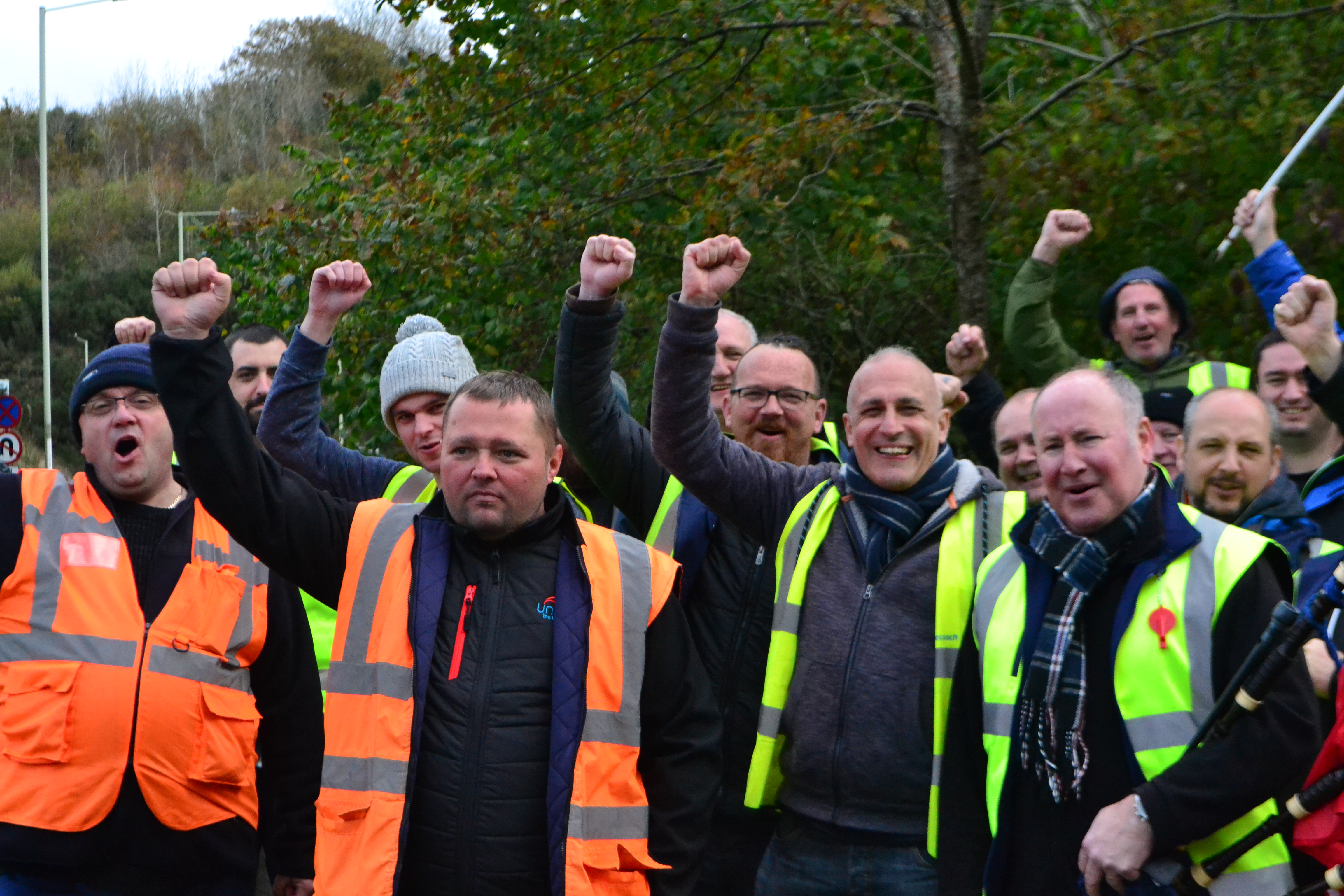
Image: Stagecoach Wales workers in the Unite union on the picket line
At the moment, however, these drivers are having to fight just to maintain basic standards of living and dignity, so it’s not surprising if they’re a bit sceptical about changes that come from the top.
“We know that in Wales, there is this push towards having full electric buses and they don’t come cheap,” says Alan McCarthy. “But should the drivers be the ones to pay for that?”
“When the main motivation is profit, then it’s always going to come at the sacrifice of something, whether that’s a commitment to environmental issues, or whether that’s a commitment to workers rights.”
He expresses a similar worry for taxi drivers, who face the full cost burden themselves of moving over to electric vehicles by 2025.
“Where are they going to get the money for that?” says Alan
“In Cardiff, in excess of 90% of the Taxi driver population are from BAME [Black, Asian and Minority Ethnic] backgrounds, already under privileged, often living in council accomodation in Butetown in tower blocks, how are they supposed to even charge an electric vehicle in those areas?”
The approach he is criticising – which pushes the burden of responsibility onto the individual – not only punishes workers but is one of the least efficient ways of moving taxi drivers to electric cars.
When bus drivers go on strike, it is exactly this kind of marketised system they are fighting against. They see the effects of a privatised transport system up close. Even within the same company, drivers face different pay rates depending on where they work. Then there are other bus firms operating different lines.
“This thing where they make depots compete with each other only serves to suppress wages and terms and conditions,” says Alan.
It’s not hard to see how this system simply won’t deliver the kind of public transport system needed if something like a Green New Deal – that’s aimed at creating decent green jobs to reduce carbon – is ever to become reality.
Alan’s proposed solution – a fully nationalised bus service that operates for the social good – is what’s needed, but it requires confrontation with the market and profiteers.
This is where strikes can be so important and in Wales and elsewhere, the signs of a new mood among workers to fight back are encouraging.
NHS, local government, DVLA, transport and private sector workers – to name a few – have all moved towards industrial action recently. And in the north, Arriva Wales bus workers are planning a five-week pay strike after 95% of the workforce voted for action.
Undoubtedly the experience of the pandemic – where low-paid key workers were on the frontline whilst the super rich stayed at home getting even wealthier – has fed into this.
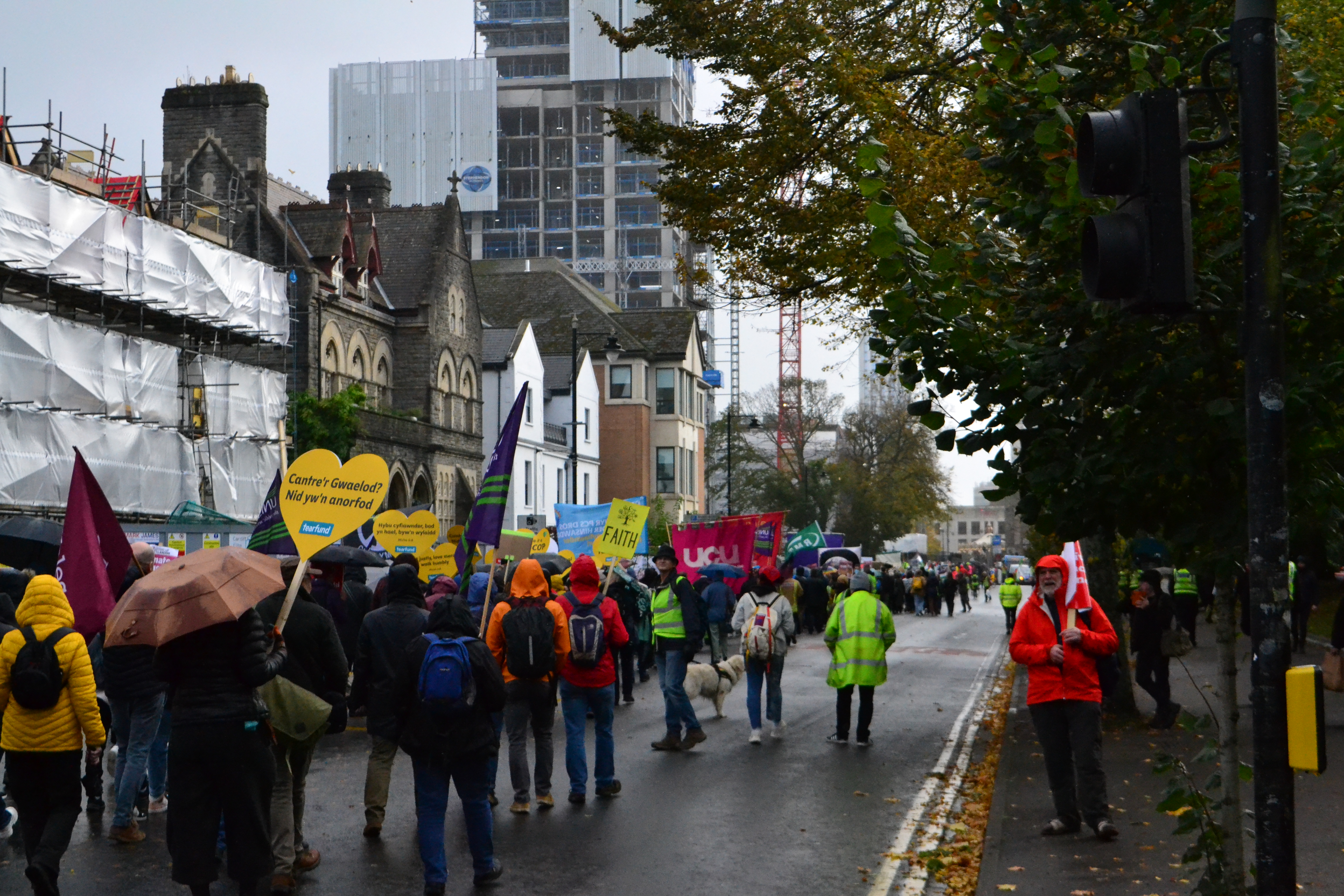
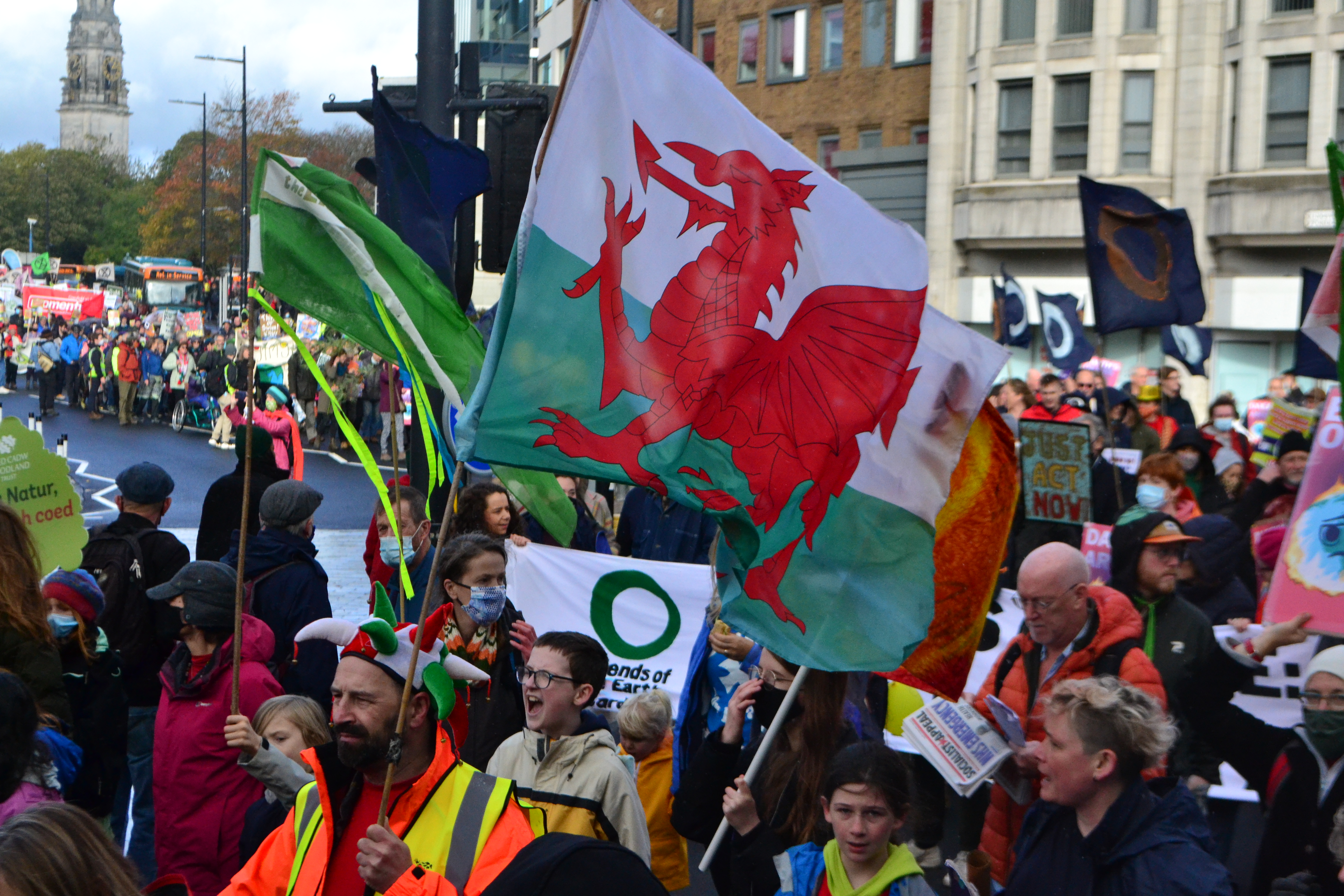
Images: Climate protests in Cardiff, November 6th
One question thrown up by this situation is what impact will an increase in working class struggle have on the climate movement, and vice versa? Afterall, the climate crisis affects every worker.
There is clearly more of a coming together of the movements than ever before – anyone attending the large COP26 protest in Cardiff would have seen trade union banners and heard from union speakers in a way that didn’t happen at previous climate protests. That is only part of the picture however.
Perhaps the place where the links can be seen more than anywhere is Glasgow.
COP26 strikes – “Clear links between workers and climate issues.”
On Monday 1st November, as COP26 kicked off, Glasgow cleansing workers in the GMB union began a pay strike against the local SNP-run council.
Glasgow City Council, desperate to stop the strikes and the embarrassment they would cause, even used anti-union legislation in a bid to get the courts to prevent them going ahead.
The effort, which was unsuccessful, has nevertheless drawn huge anger towards the local SNP council and any claim it has to being progressive or favourable to workers.
On the first day of the strike, Chris Mitchell, the GMB convenor whose daily videos became a major feature of the dispute, told the BBC why workers were walking out.
“We find ourselves in a position where our members are angry and they’re making a stand,” he told presenter Evan Davis, pointing out that the issue of rats in the city was down to continued austerity.
“We’ve got a pride for this city, work in this city, bring my family up in this city, so we wanna do our best but our workers have faced cuts for years.”
Davis asked if the union “would be better not to strike with all the world’s eyes on the city.”
Mitchell responded that the fault lay with the council, but the question reflected a deep frustration among the Scottish establishment over how the strikes have embarrassed both the UK Government and the SNP, who are desperate to show off their credentials as a party that can fit in with the global ruling class.
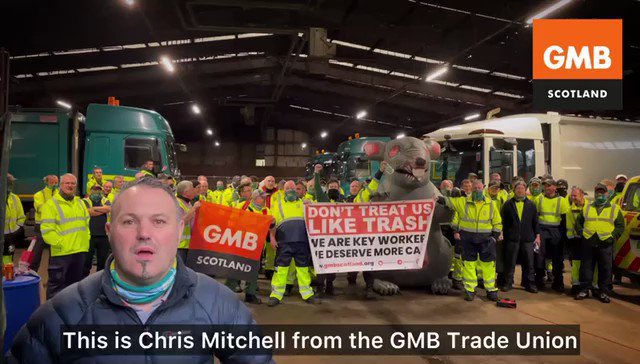
Image: Chris Mitchell of the GMB making a video in support of the Glasgow cleansing strike
“The cleansing strike in general made a real impact on the whole question of COP, it was part of press coverage, it was central to linking together the question of worker struggles and climate activism,” says Jonathon Shafi, a socialist and activist in Glasgow.
He points to the fact that the strikers joined the Fridays for Future climate strikers at the end of the first week of the conference, and that in turn climate activists have been raising the question of the strike.
“Not just in the picket lines but within their own assemblies as well,” he says. “Clear links are being drawn between both the climate struggle and the struggle for better pay and conditions.”
He says that the strike – and the anti-union tactics adopted by the council to try and stop it – have exposed the “gap between the rhetoric of the SNP and the reality of their policy.”
“We saw this with the cleansing [workers], but we also see this in various other aspects of their climate policy.”
This contradiction was also seen in a scandal surrounding travel passes for the conference. Delegates received a single travel card they could use on all public transport in the city for free, whereas ordinary Glasweigians who keep the city running had to have multiple tickets for different services.
In other words, the elite who have descended on Glasgow got something resembling a state run travel network, whereas ordinary people get the marketised system of multiple, expensive, inefficient and disjointed operators.
It is a microcosm of the kind of environmentalism envisioned by the capitalist class that make up COP26- wholly in favour of the elite and a total disaster for the environment.
But in Glasgow over the past two weeks, the climate movement has also played a major role in disrupting the conference and disputing its claim to be some kind of authority on climate change.
The most well known climate striker, Greta Thunberg, told protesters outside the conference that COP26 was no more than an expensive sham.
“This is no longer a climate conference, this is now a global north greenwash festival,” she shouted. “A two week long celebration of business as usual and blah blah blah.”
As the conference ended on Friday, the environmentalist George Monbiot summed up the agreement which had been arrived at by this expensive jamboree: “The world’s powerful governments propose to do more to defend the fossil fuel industry than to defend life on Earth.”
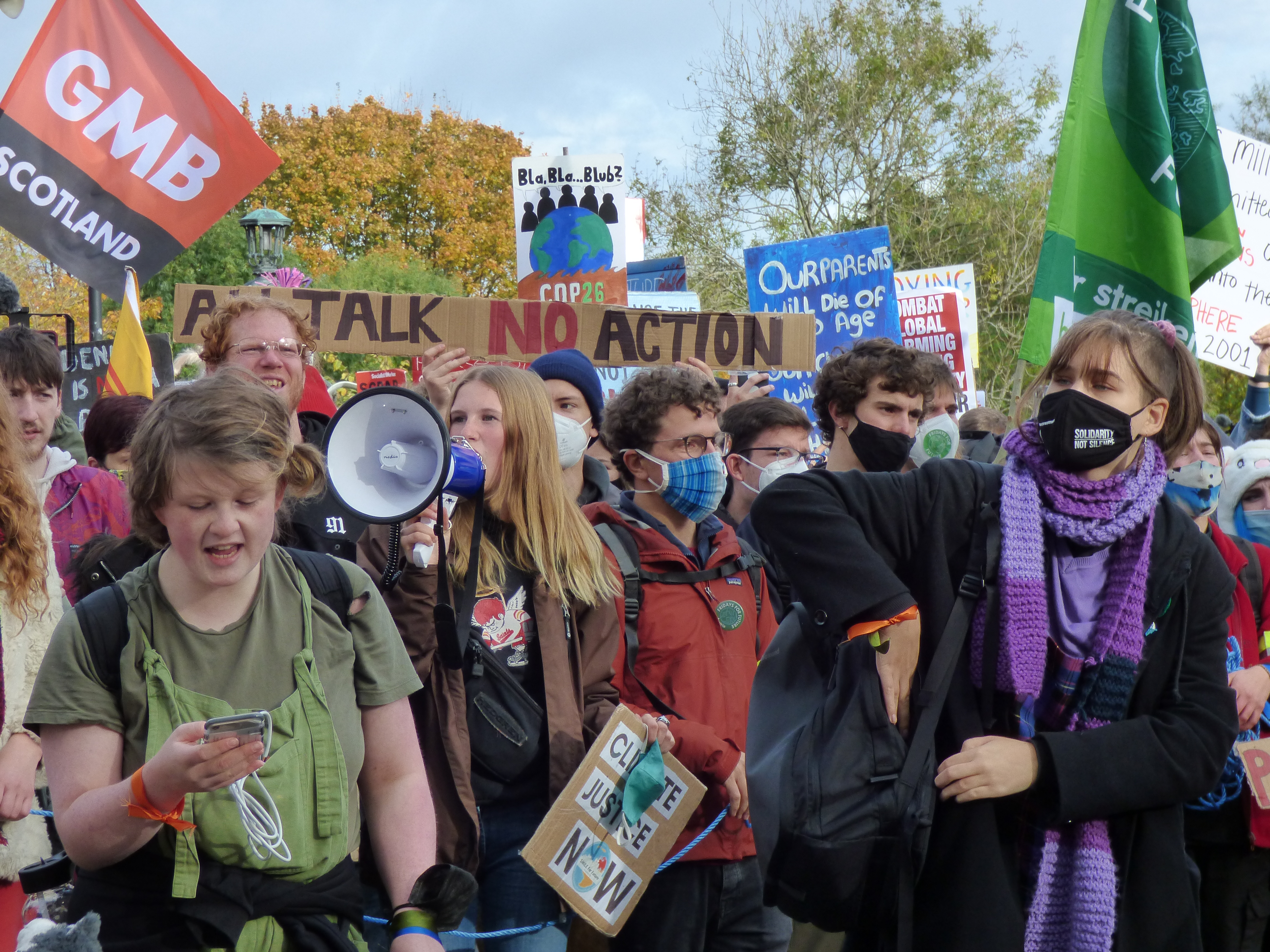
Image: Fridays for Future March, Glasgow, 5th November
But the anger that had spilled onto the streets, and merged with striking workers throughout the week, was significant.
“I think it’s shown that the people who are going to actually be able to confront the system and bring about the change that’s necessary, are not the insiders around COP and global leaders,” Jonathon Shafi says.
“It’s going to be workers taking action allied to a mass movement of opposition to the present economic model which inherently drives climate change.”
Does he think that the strikes and the protests around COP26 represent a step change in this respect?
“I think it’s shown the possibilities of building that kind of movement,” he replies. “It’s embryonic in the present moment but it shows the potential, and it shows the importance of people having their own agency and not just relying on the fine words of leaders which are never actually delivered.”
He says it’s ‘tentative,’ but there’s definitely an uptick in workers’ activity that will be crucial in realising this potential. “And the more solidarity that these actions receive, the more likely they are to be generalised into other areas,” he adds.
“They’ve had time to talk, band together.”
Back on the Stagecoach picket line, the evidence of a new mood amongst workers to fight is clear.
It is Friday the 5th November, day 13 of the strike and there are almost 40 workers standing out on the picket line -a huge turnout.
As I’m talking to people, a car pulls up and within a matter of seconds, the person inside, who isn’t known to the bus drivers, hands over two boxes of biscuits.
One worker, Calum, says that the experience of the strike has changed people and the attacks on the union from bosses has only made people stick together more.
“All it does is make us band together even tighter. The morale in the depot has been quite low for a long time. But this is the happiest I’ve seen some of my colleagues,” he says.
Why do you think that is?, I ask.
“Because they’ve had time to talk, come together,” he explains. “You know, it can be quite isolating being out on the bus on your own. And you think, is it only me that’s worried about X,Y, Z. But then you get talking to all your colleagues and suddenly find no, it’s not just me.”
This strike is not about climate change, it’s about pay and conditions for a group of workers who’ve seen their living standards tumble for years. If they win, it will first and foremost be a victory for them, their families and the wider community. But it will also be a victory for workers everywhere.
If the strike continues, it will need as much support and solidarity as it can get.
“Nobody’s going to back down until they pay us what we deserve,” says Cath, a single parent and a bus driver.
“It’s gonna be hard for everybody,” she says of the prospect of being on strike over Christmas. “But it’s got to be done, hasn’t it.”

